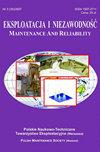地面全球导航卫星系统振荡器的老化
IF 3.1
3区 工程技术
Q2 ENGINEERING, MULTIDISCIPLINARY
Eksploatacja I Niezawodnosc-Maintenance and Reliability
Pub Date : 2022-04-21
DOI:10.17531/ein.2022.2.18
引用次数: 5
摘要
全球卫星导航系统(GNSS)广泛应用于人类生活和活动的许多领域。GNSS系统的正常运行取决于几个因素,其中最重要的是对时间的正确认识。这个位置间接地基于距离的知识,而距离是根据时间和电磁波速度的知识来确定的。因此,正确(准确)的时间知识(gnsclock稳定性)是精确定位的关键。本文分析了1994-2020年全球导航卫星系统台站时钟的长期稳定性。为此目的,使用了选定的永久站的时钟的修正值,并分别确定了所有年份的稳定性。然后分析了时钟稳定性随时间的变化和相关性的搜索。结果表明,所分析的四种类型的振荡器之间存在明显的差异。如果以年度为基础进行比较,则没有发现随时间的变化。本文章由计算机程序翻译,如有差异,请以英文原文为准。
Aging of ground Global Navigation Satellite System oscillators
Global Navigation Satellite System (GNSS) are widely used in many areas of human life
and activity. The proper functioning of GNSS systems depends on several factors, the most
important of which is the correct knowledge of time. The position indirectly is based on
the knowledge of the distance, which is determined based on time with the knowledge of
the speed of the electromagnetic wave. Thus, proper (accurate) knowledge of time (GNSS
clock stability) is a key to precise positioning. In this text, the long-term stability of the
GNSS station clocks covering the years 1994-2020 was analysed. For this purpose, the
corrections of the clocks at selected permanent stations were used, and their stability was
determined for all years separately. Then the change of clock stability over time and the
search for correlation were analysed. As the results showed, there are clearly differences
between four of the type of oscillators analysed. In case of the comparison on an annual
basis, no change over time was found.
求助全文
通过发布文献求助,成功后即可免费获取论文全文。
去求助
来源期刊

Eksploatacja I Niezawodnosc-Maintenance and Reliability
ENGINEERING, MULTIDISCIPLINARY-
CiteScore
5.70
自引率
24.00%
发文量
55
审稿时长
3 months
期刊介绍:
The quarterly Eksploatacja i Niezawodność – Maintenance and Reliability publishes articles containing original results of experimental research on the durabilty and reliability of technical objects. We also accept papers presenting theoretical analyses supported by physical interpretation of causes or ones that have been verified empirically. Eksploatacja i Niezawodność – Maintenance and Reliability also publishes articles on innovative modeling approaches and research methods regarding the durability and reliability of objects.
 求助内容:
求助内容: 应助结果提醒方式:
应助结果提醒方式:


